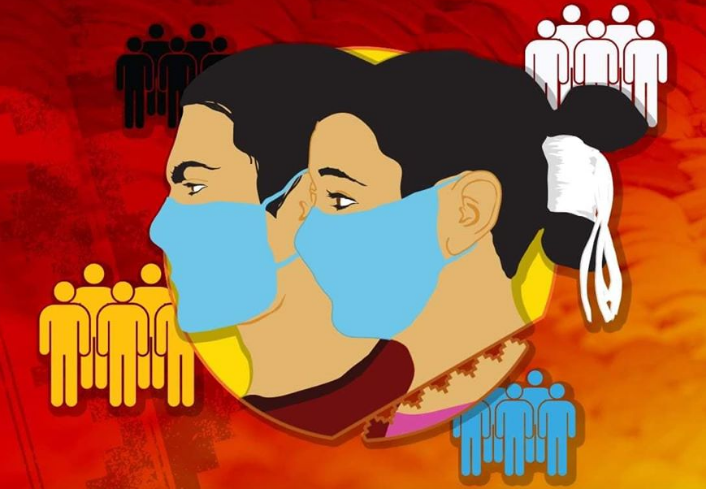
- Details
- By Native News Online Staff
WINDOW ROCK, Ariz. — Navajo Nation President Jonathan Nez warned Navajo citizens on Monday precautions are still necessary even though vaccinations have begun on the nation’s largest Indian reservation.
“Although our people are receiving the vaccines, we have to keep fighting and keep taking all precautions to prevent Covid-19. We must also be aware of the new variant of the virus that is also spreading in nearby regions. Even if you receive the first and second dose of the vaccine, you have to continue to be very careful and keep wearing a mask in public and think of the health and safety of others,” Nez said.
Nez asked that Navajo citizens still stay at home whenever possible.
“Do not hold in-person gatherings with anyone outside of your immediate household, avoid crowds and practice social distancing, wear a mask in public, and wash your hands often with warm water and soap for at least 20 seconds,” Nez continued.
On Monday, the Navajo Department of Health, in coordination with the Navajo Epidemiology Center and the Navajo Area Indian Health Service, reported 65 new Covid-19 positive cases for the Navajo Nation and three more deaths. The total number of deaths is now 922 as of Monday. Reports indicate that 13,532 individuals have recovered from Covid-19, and 223,323 Covid-19 tests have been administered. The total number of positive Covid-19 cases is now 26,448.
Navajo Nation Covid-19 positive cases by Service Unit:
- Chinle Service Unit: 4,910
- Crownpoint Service Unit: 2,656
- Ft. Defiance Service Unit: 2,727
- Gallup Service Unit: 4,244
- Kayenta Service Unit: 2,438
- Shiprock Service Unit: 4,642
- Tuba City Service Unit: 3,096
- Winslow Service Unit: 1,698
* 37 residences with Covid-19 positive cases are not specific enough to place them accurately in a Service Unit.
On Monday, the state of Arizona reported 5,400 new cases, Utah reported 1,082, and New Mexico reported 628 new cases. The Navajo Nation’s stay-at-home order remains in effect for all residents with the exception of essential workers who must report to work, to obtain essential items such as food and medication, and in cases of emergencies.
Vaccination Registration
The Navajo Health Command Operations Center, under the Navajo Department of Health, now has an online registration form available for those who want to receive the Covid-19 vaccine. The online registry will assist with planning the allocation of vaccines and in scheduling individuals at the appropriate health care facility. Please visit the following link for more information and to register: https://www.ndoh.navajo-nsn.gov/Covid-19/Covid-19-Vaccine/Vaccine-Registration.
Covid-19 testing schedules are available online at the Navajo Health Command Operations Center website: https://www.ndoh.navajo-nsn.gov/Covid-19/Covid-19-Testing. For more information, including helpful prevention tips, and resources to help stop the spread of Covid-19, visit the Navajo Department of Health's Covid-19 website: http://www.ndoh.navajo-nsn.gov/Covid-19. For Covid-19 related questions and information, call (928) 871-7014.
More Stories Like This
Native News Weekly (August 25, 2024): D.C. BriefsNavajo Nation Mourns the Passing of Former Vice President Rex Lee Jim
Deb Haaland Earns Endorsement From Communications Workers of America Local 7076
University Soccer Standout Leads by Example
Two Native Americans Named to Democratic Congressional Campaign Committee's“Red to Blue” Program
Help us defend tribal sovereignty.
At Native News Online, our mission is rooted in telling the stories that strengthen sovereignty and uplift Indigenous voices — not just at year’s end, but every single day.
Because of your generosity last year, we were able to keep our reporters on the ground in tribal communities, at national gatherings and in the halls of Congress — covering the issues that matter most to Indian Country: sovereignty, culture, education, health and economic opportunity.
That support sustained us through a tough year in 2025. Now, as we look to the year ahead, we need your help right now to ensure warrior journalism remains strong — reporting that defends tribal sovereignty, amplifies Native truth, and holds power accountable.
 The stakes couldn't be higher. Your support keeps Native voices heard, Native stories told and Native sovereignty defended.
The stakes couldn't be higher. Your support keeps Native voices heard, Native stories told and Native sovereignty defended.
Stand with Warrior Journalism today.
Levi Rickert (Potawatomi), Editor & Publisher

